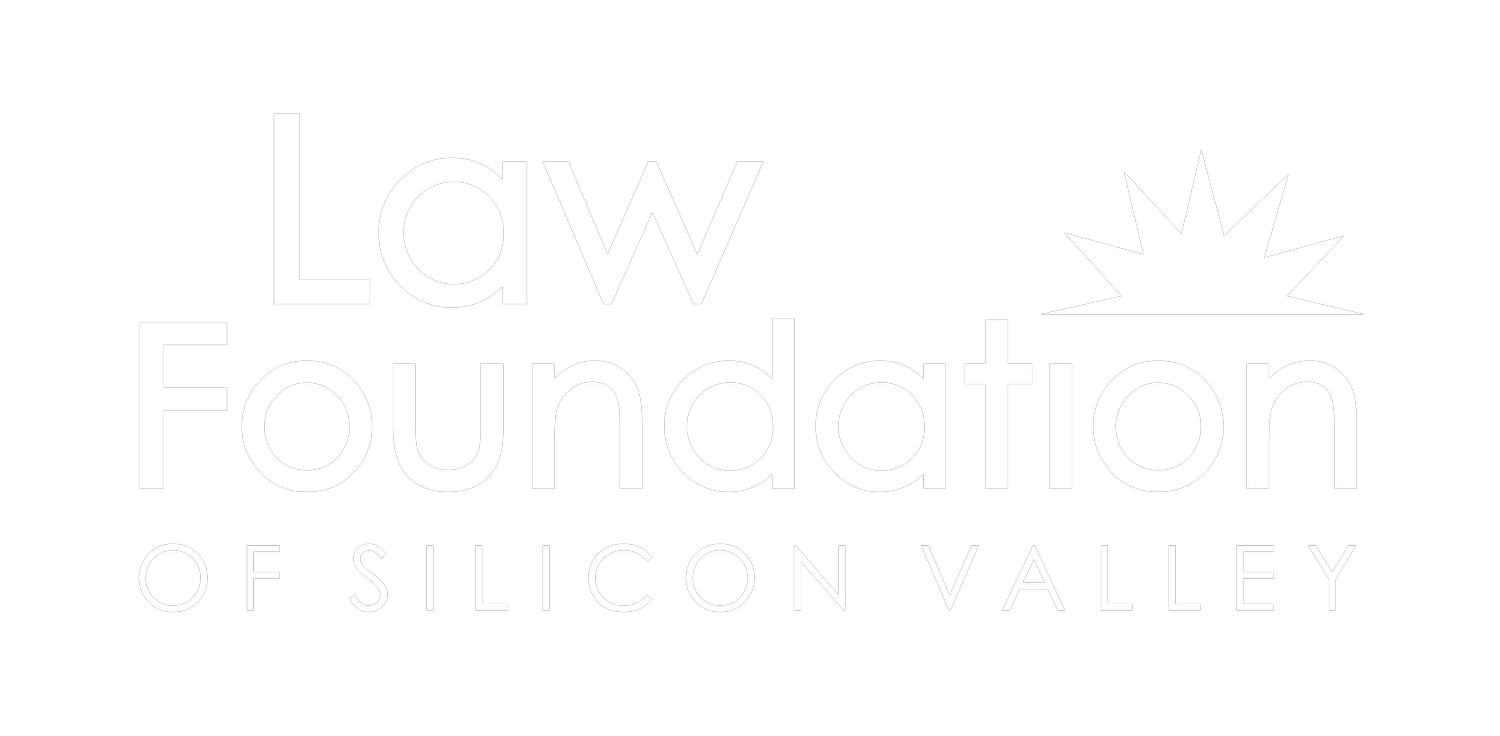Dear Friends,
It's has been a year like no other.
After Justice Ruth Bader Ginsburg's death in September, I've reflected on her legacy as a legal icon. I was personally inspired by her fierce advocacy for equality under the law and her impact as a pioneer for all women. Her memory will continue to be a blessing to me as we fight for justice and equality for all in Silicon Valley and beyond.
There's a lot we don't know about the future. But there's one thing we know for certain: in the face of adversity, Law Foundation supporters know how to meet the moment for their neighbors. I'm grateful to this community for defending our values of justice and equity for everyone, regardless of race or socioeconomic status. We're excited to celebrate you at our first-ever A Toast to Justice on November 18.
At this unique and engaging event, we'll show our gratitude for you and other loyal donors and volunteers, and share insider stories on the impactful work our incredible team is doing to respond to the pandemic. This will be a bright spot in an otherwise dark time. We look forward to seeing you on November 18!
As we head into election season, it can feel like every passing day brings another struggle. But our supporters and the communities we serve, keep me going. Thank you for being at our side.
In gratitude,
Alison Brunner, Esq.
CEO
News
Join Us for A Toast to Justice on November 18
A Toast to Justice is a one-of-a-kind Law Foundation event to say thank you to our supporters, volunteers, and the entire community. A Toast to Justice is free and open to all. Join us in celebrating the Law Foundation's impact and the supporters who make our work possible. We'll also share the latest updates on the tremendous work the Law Foundation is doing to respond to the pandemic. Register today for this special event on November 18.
Stock Image
Preventing Homelessness for Morgan Hill Family
Maria* is a domestic violence survivor and single mom of three kids, ages 6, 11, and 16. Each of her children has a disability, including hearing loss, PTSD, and night terrors. Late last year, neighbors complained to Maria's landlord about noise. The family became so scared they might lose their apartment that they started eating standing up because they were afraid that moving chairs across the floor would lead to another noise complaint.
Earlier this year, her landlord served her with an eviction notice. Facing homelessness, Maria came to the Law Foundation for help. Together, our attorney and community worker negotiated with the landlord for a reasonable accommodation that allowed Maria and her three children to move to a first-floor unit and stay housed, which was especially critical in the middle of the pandemic. If a noise complaint is issued in the future, Maria's building manager must meet with her to address complaints before trying to evict her and her children again.
*Name has been changed for privacy.
Law Foundation in the Media
New California eviction protections come with a wish - federal funds (Mercury News, 9/1/2020)
AB 3088, la nueva ley de California que prohíbe desalojos si se paga el 25% del alquiler (Univision, 9/1/2020)
California eviction moratorium is 'a real nightmare' for renters to understand - here's what you need to know (MartketWatch, 9/5/2020)
Bay Area renters making fewer payments as pandemic lengthens (Mercury News, 9/9/2020)
San Jose begins cleaning up massive piles of illegal dumping on Monterey Road (Mercury News, 9/22/2020)
Coronavirus in Jails
Our Health team represents many clients who are incarcerated, and our work advocating for adequate precautions inside the jail amidst the pandemic continues. Our team of attorneys and advocates are investigating, monitoring, and advocating for improved safety conditions for people in Santa Clara County jails. Working directly with people who are incarcerated and community-based groups representing family members of detainees, staff are pushing the Sheriff's Department to adopt greater protective measures against the spread of COVID-19. The risk of serious illness or death from COVID-19 is greater among incarcerated people because of the design of facilities, the intersection between racial and social inequities in health care availability, and racial discrimination in policing and the criminal justice system.
October is Domestic Violence Awareness Month
Throughout October, lawyers, advocates, law enforcement and survivors are gathering to discuss how to prevent domestic violence and better serve survivors. The COVID-19 crisis has made it more difficult for our clients to access resources and safely leave an abuser. Shelters are impacted, financial resources are scarce, and court access has been limited.
Despite many challenges, the Law Foundation's Children & Youth program continues to serve and empower teens and young adults who experience Intimate Partner Violence (IPV) through free legal services. Because of the pandemic, our practice looks a little different. We're doing initial client interviews via video calls, we're teaching clients how to use electronic signatures, and we're having clients appear by telephone when possible at court hearings. Since March, we've worked with 50 clients who are being abused to help them gain greater personal security.
Recently, our staff helped a teen mom obtain custody and visitation orders from an abusive ex-partner. She came to the Law Foundation two days before a court-ordered "Emergency Screening," an investigative court process where custody decisions are made. Our client was concerned for the safety of herself and her child. We were able to quickly connect her with a staff member so that she did not go alone to any court proceedings, and today our client and her child are safe from abuse.
ADVOCACY
Law Foundation Supports Equality for All with #Prop16
Everyone deserves an equal shot at fair wages, good jobs, and quality schools, regardless of race or gender. Proposition 16 helps fight discrimination, so California can take a step towards equal opportunity for all families. Leveling the playing field and fighting discrimination aligns with the Law Foundation's vision, so we're glad to support this movement in the right direction with #YesOnProp16.
IN CASE YOU MISSED IT
San Jose Adopts Anti-Displacement Plan
The 10-point strategy is aimed at keeping low-income renters in the City and is a first-of-its-kind plan for addressing the issue of evictions and displacement targeting low-income communities. As part of the PolicyLink Anti-Displacement Policy Network cohort that created the Community Strategy to End Displacement Report, we're proud that our collaborative work resulted in a citywide strategy. Read more.
Census Scams - A Video for Youth By Youth
We worked with iFoster youth to create a short video to educate young people about scams from people claiming to be census workers. People posing as census workers are collecting sensitive information, leaving youth at risk of identity theft. Watch the video.
Latest Update on COVID-19 Eviction Protections
Local, state, and federal laws established in response to the pandemic have created a patchwork of protections for renters to navigate. We've been informing renters about their rights through our intake line, sharing our multilingual FAQs, media outreach, and providing printed cards directly to renters and community partners. We are also continuing to offer advice and services to small businesses at risk of eviction through the Small Business Pro Bono Program.
PRO BONO SPOTLIGHT
We're gearing up for Pro Bono Week, October 25-31, 2020! This year's theme is "Rising to Meet the Challenge: Pro Bono Response to COVID-19." With the launch of the Small Business Pro Bono Program and continued participation in the Name and Gender Marker Change Clinic and Special Education Clinic, our volunteers have provided a shining light during this tough time.
During Pro Bono Week, we'll be thanking our volunteers on our social media channels and highlighting some of their accomplishments this year. Follow us on Facebook, Twitter, and LinkedIn to tune in.
We're also excited to celebrate and thank our Pro Bono Partners at the Law Foundation's upcoming virtual event, A Toast to Justice on November 18. Register here!










